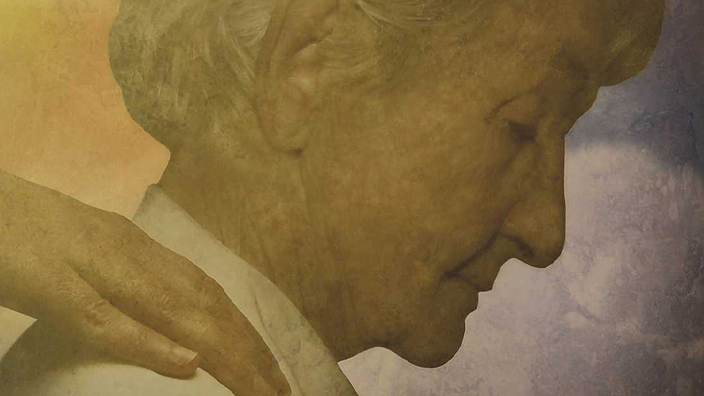
In September, attention turns to the Alzheimer’s stamp
The semipostal release raises money to combat the disease
The Postal Service will highlight its Alzheimer’s semipostal stamp in September.
Semipostal stamps are First-Class Mail stamps sold at a price above the cost of a regular stamp to raise funds for designated causes.
The Alzheimer’s release has raised about $1.6 million since its introduction in 2017. More than 11 million Alzheimer’s stamps have been sold.
Alzheimer’s, the most common form of dementia, is a progressive, irreversible disorder that attacks nerve cells and their connections in the brain, causing memory loss, decrease in cognitive skills and changes in behavior. The disease is named for Alois Alzheimer, a German physician who discovered and described two hallmark signs of the disease in 1906.
More than 5.3 million Americans age 65 and older are estimated to have Alzheimer’s disease.
The Alzheimer’s semipostal stamp features an illustration that first appeared on a 42-cent Alzheimer’s Awareness stamp released in 2008. It shows an older woman in profile with a hand on her shoulder, with the suggestion of sunlight behind her.
USPS facility leaders and employees can promote the stamp in September but must follow the organization’s rules on semipostal stamp activities.
Employees with questions about these activities should email the USPS Ethics Office.

She fiddles around when she’s not skating about
This employee enjoys playing the violin as well as ice hockey
My name is Abby Martin and I’m an integration and support manager at USPS headquarters in Washington, DC.
When I’m not at my job, I alternate between playing the fiddle and ice hockey.
Before I started fiddling, I learned the violin. I started classically training at age 7. I also played in my school orchestra.
I became interested in fiddling when I was in high school. I made a deal with my violin teacher at the time that if I mastered my classical pieces, she would teach me a fiddle tune at the end of every lesson.
Currently, I play in a local folk trio. I met my bandmates through hockey. They have also been teammates of mine for almost 15 years now.
I did not grow up playing hockey but decided as an adult that I could learn. I joined an all-female team called the Washington Wolves.
It turned out two of my teammates had lost a member of their band who sang and played the violin. They encouraged me to join them.
We perform in local gigs a handful of times a year such as porch fests in neighborhoods in Washington and in Takoma Park, MD. We also perform at farmers market events and get together about once a week to practice.
I also perform solo. I helped warm up the crowd at the recent stamp dedication ceremony honoring the 250th anniversary of the Postal Service. I performed two numbers, “Old Joe Clark” and “Devil’s Dream,” for hundreds of attendees outside the front of postal headquarters on L’Enfant Plaza. I also performed at a recent talent show held during the National Postal Forum in Nashville along with my colleague Mike Porter.
Both the fiddle and playing hockey have taught me lessons that I have applied to my Postal Service career. Things take practice and work — we’ll get there in the end. I know we can persevere, but don’t let a challenge derail you if it doesn’t work the first time.
I always feel so lucky that I get to do things like fiddling and playing hockey. My Postal Service position grants me the flexibility I need to do them.
“Off the Clock,” a column on Postal Service employees and their after-hours pursuits, appears regularly in Link.

Don’t toss most used batteries in the trash
Employees should follow the proper procedures for disposal
The Postal Service is reminding employees to follow the proper procedures for the handling, storage and disposal of used batteries.
Most used batteries contain hazardous components and cannot be tossed in the trash. These batteries are typically regulated as universal waste and include batteries from mobile scanners, phones, laptops and other electronic equipment.
USPS facilities must recycle universal waste batteries — which include small nonalkaline dry-cell batteries and small sealed lead-acid batteries — using services provided by Cleanlites Recycling through eBuy Plus, the USPS online purchasing platform.
The USA Lamp and Ballast Recycling catalog, part of eBuyPlus, has more information.
Alkaline batteries are typically not regulated as universal waste, except in California, where they must be recycled through Cleanlites.
Employees should arrange for car and truck batteries to be picked up for recycling through their facility’s vehicle battery supplier. Recycling of industrial lead-acid batteries should be arranged through EnerSys.
Used batteries should not be sent to the Atlanta Mail Recovery Center; the Ybor City, FL, Processing and Distribution Center; or the Topeka, KS, Material Distribution Center.
The Environmental Affairs and Corporate Sustainability Blue page has more information. Facility managers should consult their environmental specialist on state-specific universal waste regulation.
Memories of Katrina
A reader recalls the heroic response to a tragic storm
Email us your feedback. Your comments could be included in our “Mail” column.
‘Five Fundamentals of Financial Well-Being’
Postal Service employees may participate in an upcoming webinar that will discuss the signs of money mismanagement and its effects on health.
The session, “FiveFundamentals of Financial Well-Being,” will be held Thursday, Sept. 11, from noon to 1 p.m. Eastern.
Representatives from United Health Care, a provider of health plans for federal employees, will lead the discussion.
Participants must register before the event on the webinar website.
Participation is voluntary. Nonexempt employees must participate off the clock or during authorized breaks. Employees with questions can email the USPS Benefits and Wellness team.
WestPac Area, Connecticut District lead in scanning
A snapshot of Postal Service scanning data shows the national rating was 96.69 percent during the week ending Aug. 29, down 0.13 percent from one week earlier.
The data was collected Sept. 3.
WestPac led the four areas with a rating of 97.14 percent, while Southern ranked last with a 96.23 percent rating.
Among the 50 districts, Connecticut, part of Atlantic Area, ranked first with a 98.13 percent rating, while Puerto Rico, part of Southern Area, ranked last with an 88.18 percent rating.
Scanning data allows customers to track their mail and packages, which helps USPS deliver excellent service, boost loyalty and drive revenue.
To see the latest data, go to the Informed Visibility website and select “Customer Experience,” followed by “DES 2 Scan Performance.” Postal Service employees must request Informed Visibility access through eAccess.
View past printouts
Printout details
What's included
-

In September, attention turns to the Alzheimer’s stamp
-
 Off the Clock
Off the ClockShe fiddles around when she’s not skating about
-

Don’t toss most used batteries in the trash
Employees should follow the proper procedures for disposal
-
Mail
Featured reader quote
“Thank you to Link for recognizing the 20th anniversary of Hurricane Katrina. All of the postal workers from New Orleans, the state of Louisiana, and around the country stepped up...”
— Polly Gibbs, Plano, TX
-
September11Datebook
‘Five Fundamentals of Financial Well-Being’
-
Brief
WestPac Area, Connecticut District lead in scanning